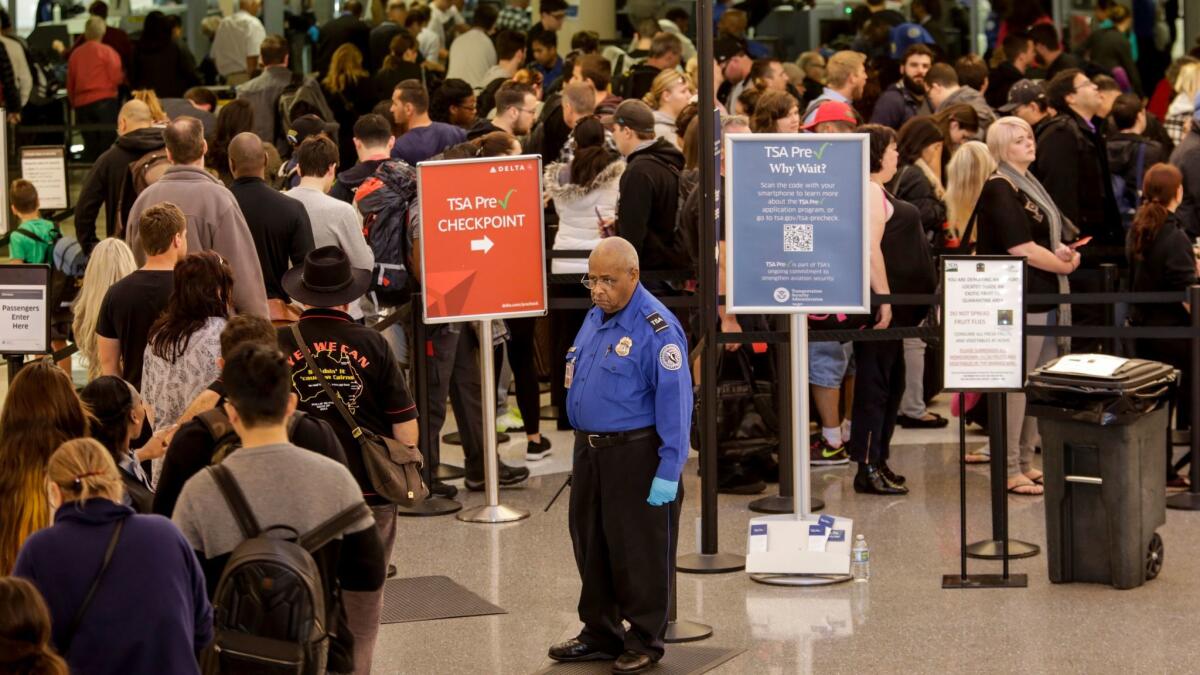TSAâs own files say its program to stop terrorists is unreliable, ACLU says

A controversial program designed to spot potential terrorists at airports by their actions and verbal clues is not supported by studies cited by the Transportation Security Administration and may be used to target minorities.
That is the conclusion reached by the ACLU after the group successfully sued the TSA to collect more than 12,000 pages of reports and studies used by the security agency to defend the effectiveness of the program.
The lawsuit was filed in 2015 because the TSA failed to respond to a request under the Freedom of Information Act, the ACLU said.
âThe records include numerous academic studies and articles that directly undermine the premise of the program,â the ACLU said in a report released Wednesday. âThe scientific literature in the TSAâs own files reinforces that deception detection is inherently unreliable.â
The TSA rejected the ACLUâs conclusions, saying the program is one of several layers of security designed to thwart terrorist threats.
âBehavior detection is threat-agnostic, and unlike technology, does not become obsolete when the adversary develops a new weapon or tactic,â TSA spokesman Bruce Anderson said.
At the center of the controversy is the TSAâs Screening Passengers by Observation Techniques program, known as SPOT. The program is designed to catch potential terrorists by deploying specially trained officers â some dressed in casual clothes â to question travelers and look for signs of stress, fear or deception.
The TSA has spent more than $1 billion since the program was launched in 2007 to deploy about 3,000 behavior-detection officers to 176 of the more than 450 airports in the United States.
This is not the first time the program has been under fire. The Government Accountability Office said in 2013 that a study that the Department of Homeland Security relied upon to validate the program was flawed and inconclusive.
The ACLU says the academic literature produced by the TSA to support the program, in fact, shows there are flaws to the premise that physical cues can point to a liar.
âDespite decades of research effort to maximize the accuracy of deception judgments, detection rates rarely budge,â according to a study offered by the TSA. It was written by professors at Texas Christian University and UC Santa Barbara.
The documents received by the ACLU suggest that some behavior detection officers may have targeted minorities, including Latino and Middle Eastern travelers, for extra questioning and screening. It cited investigations into racial profiling in Miami, Chicago and Honolulu.
But determining if TSA officers were guilty of racial profiling was difficult in some investigations because the TSA doesnât keep track of the race or ethnicity of those travelers questioned under the behavior-detection program.
NEWSLETTER: Get the dayâs top headlines from Times Editor Davan Maharaj Âť
Still, the ACLU released an anonymous comment written by a TSA officer to a private agency conducting a study for the TSA, saying: âWhatâs worse is Iâve heard a [behavior-detection officer] manager refer to passengers as âtowel headsâ when speaking in a meeting with other management and his subordinates.â
Hugh Handeyside, a staff attorney for the ACLU, said the documents were collected to make them available to the public to put pressure on other government agencies to investigate and eliminate the program.
âWe are now putting the ball in the Congressâ court and the court of other oversight entities to take action,â he said.
To read more about the travel and tourism industries, follow @hugomartin on Twitter.
ALSO
Lyft pledges to donate $1 million to ACLU following Trumpâs immigration order
Without citing evidence, Trump says terrorist attacks go unreported by news media
Islamist terrorists have struck the U.S. 10 times since 9/11. This is where they were born
More to Read
Inside the business of entertainment
The Wide Shot brings you news, analysis and insights on everything from streaming wars to production â and what it all means for the future.
You may occasionally receive promotional content from the Los Angeles Times.











